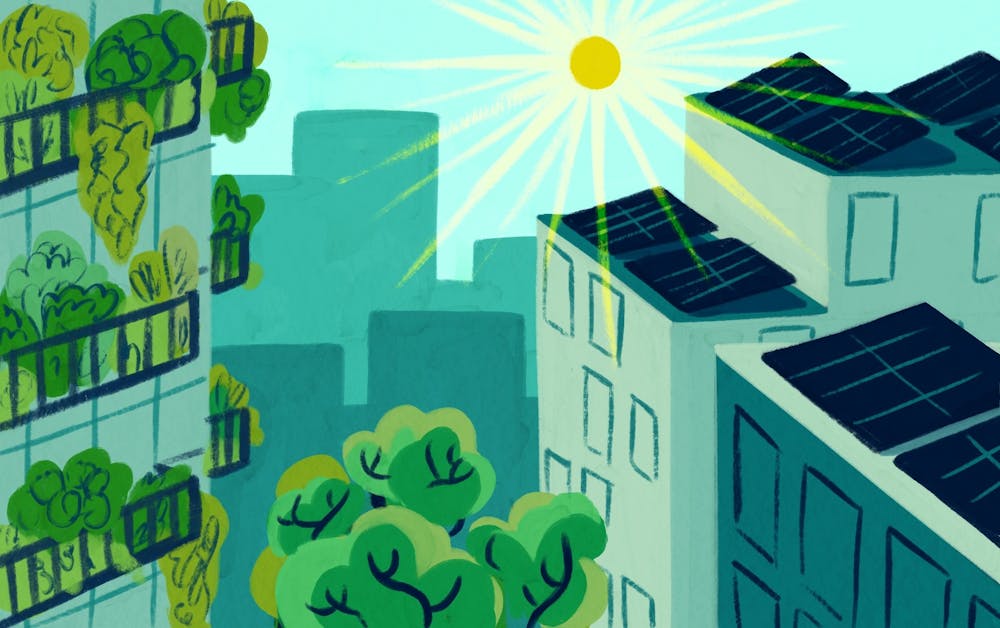When Phoenix, among other Valley cities, changed to LED streetlights, it was thanks in part to a network formed by the Global Institute of Sustainability and Innovation to help cities from around the state share the best practices for sustainability.
In 2006, ASU became the first university in the world to offer a degree in sustainability when it opened the School of Sustainability. Being the first had its challenges, but it has also led to the creation of various sustainability projects, like the Sustainable Cities Network.
“The Network was created in 2009 to bring together cities from across the Valley to promote best practices for sustainability and translate research into action,” Christopher Boone, the dean of the School of Sustainability said.
The network encompasses cities from across Arizona, including Phoenix and Mesa.
Mark Hartman, chief sustainability officer for the city of Phoenix, said he believes that the city's overall presence in the Valley is what led them to become a founding member of the network.
"(Phoenix is) about half the size of the Valley," Hartman said. "You can have a community network, but Phoenix being part of it will be important."
Another major reason for the network’s founding was to encourage collaboration between cities at a regional level.
“Air quality doesn’t stop at a city border,” Laura Hyneman, the deputy director of the environmental management and sustainability department in Mesa, said.
Hyneman grew up in the Midwest where municipalities control their own water, roads and even street names, a stark difference from Arizona's more "regional view" of distributing utilities, something she said is beneficial to the Valley.
While the network is a place for cities to collaborate, they aren’t required to do everything the same way. For instance, when the city of Phoenix switched to LED streetlights last year, they replaced all of its streetlights at the same time.
However, the city of Mesa decided to phase the new lights in over time based on what neighborhood needs were.
Hyneman said one of the benefits to the approach Mesa took is it was able to implement more advanced lights than Phoenix's because they were newer.
"That really showcased the collaborative approach of the Sustainable Cities Network," Hyneman said. "And the fact that we’re all individuals and we all have our own thoughts on how to do things."
The network is also working to get the Greater Phoenix Green Infrastructure Handbook adopted by the Maricopa Association of Governments to encourage the development of green infrastructure.
According to Anne Reichman, director of the Sustainable Cities Network, engineers and planners said they previously did not have "specifications, details and standards" to develop green infrastructure, so the network worked to eliminate that excuse by developing the handbook.
“As a workgroup, they decided, 'Well, we’re just going to create those so that the planners and engineers no longer have an excuse and they can go ahead,'” Reichman said.
An example of green infrastructure on ASU's campuses would be changes brought to Orange Mall on the Tempe campus.
Part of the expansion focuses on utilizing stormwater with planted bioswales, channels that accumulate stormwater while removing debris and pollution, according to the ASU Tours website. Bioswales are stormwater runoff systems that provide alternatives to storm drains.
READ MORE: ASU team works to limit negative effects of stormwater runoff
Boone said sustainability shouldn’t have to be an inconvenience to anyone, and that rings true with the network — they aren’t asking anyone to sacrifice anything, just to look at new ways of doing it.
“It shouldn’t be a sacrifice, it should be the easiest thing to do, the simplest thing to do,” Boone said. “We shouldn’t be telling people to sacrifice, we should just be asking to do things in a way that is smarter.”
Reach the reporter at aegould3@asu.edu or follow @agouldphotos on Twitter.
Like The State Press on Facebook and follow @statepress on Twitter.

Alex Gould is one of the editors of the photo desk. He is also currently working with The Arizona Republic as an intern photographer, Cronkite News as a visual journalist and working on assets for Arizona PBS.




